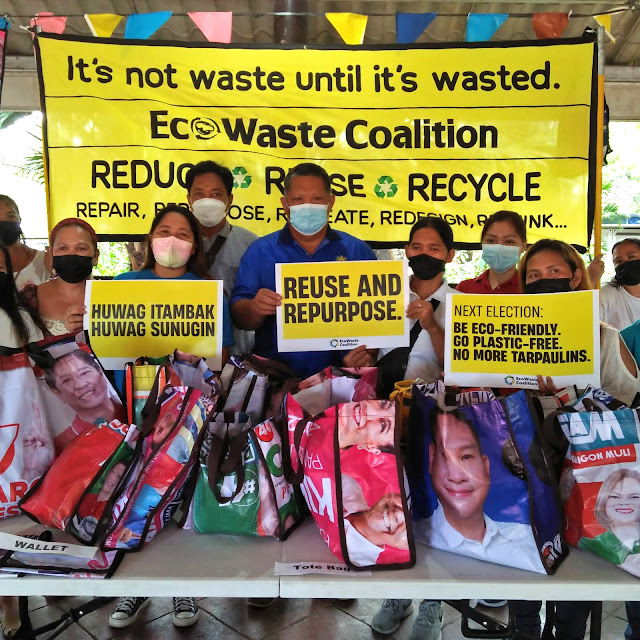EcoWaste Coalition: Reuse and Repurpose Campaign Materials to Reduce Election Trash
A zero waste advocacy organization pitched for the safe reusing and repurposing of campaign materials to conserve resources and minimize the volume of post-election garbage to be disposed of.
Two days after citizens went to the historic polls held amid the COVID-19 pandemic, the EcoWaste Coalition appealed to both winning and losing candidates to take the lead in preventing campaign materials from being thrown in landfills, burned in cement kilns and incinerators or dumped in the oceans.
“Regardless of your poll standing, we appeal to all candidates to exemplify your concern for Mother Earth and for public welfare by finding ways to prevent your publicity materials from ending up in waste dumps and furnaces and, God forbid, the oceans,” said Aileen Lucero, National Coordinator, EcoWaste Coalition.
“Dumping and burning campaign materials will be a huge waste of resources, including energy, consumed in making the seemingly incalculable number of posters, leaflets and other popular paraphernalia used for the May 2022 national and local polls,” she said. “It will further result in environmental pollution.”
For her part, Miss Philippines Earth 2021 Naelah Alshorbaji said: "Happy or not with the outcome, it remains our responsibility to clean up after ourselves and to do due diligence: recycling and upcycling where possible. Give a second life to durable materials used and responsibly dispose of non-useable items as per your local waste management rules." She likewise reminded everyone "to please not burn any items as this directly contributes to the emission of toxic chemicals, which are hazardous to health."
At an event in Quezon City that was attended by the Metro Manila Development Authority (MMDA) led by Director Francis Martinez, the EcoWaste Coalition showed how typical campaign materials can be reused and repurposed for the sake of the environment.
“While reusing and repurposing is surely not a perfect solution, especially for campaign materials laden with harmful chemicals, it will no doubt lessen the volume of trash that is collected and hauled to disposal facilities, or get spilled into the natural environment, including water bodies,” Lucero said.
In addition to decreased garbage volume, reusing and repurposing campaign materials will reduce disposal costs, prevent releases of chemical pollutants into the environment, conserve resources and instill environmental awareness and responsibility among our people, the EcoWaste Coalition said.
At the said event, the group showed how paper-based campaign materials can be creatively reused or repurposed. For example, sample ballots were turned into instant notepads with the use of a binding glue, fastener, ribbon or string. Cardboard posters were cut to make bookmarks, envelopes, folders, name plates and other school needs.
Polyethylene plastic posters were reused as book and notebook covers, and the sturdier polyvinyl chloride (PVC) plastic tarpaulin posters were cut and sewn into carry bags of various sizes. Tarps, as these materials are also called, were also made into useful ball, shoe, shoulder, string, laundry and toiletry bags, as well as waist bags for electricians and janitors. They were also transformed into aprons, letter and tool organizers, and waste sorters.
Tarps can also be repurposed as awnings or canopies for homes and stores, upholstery material, and as a protective shield against sun and rain for jeepneys, pedicabs and tricycles, the group said.
However, the EcoWaste Coalition advised the public to only reuse or repurpose tarps for non-food and non-child applications as tarps may contain hazardous chemicals, particularly cadmium and phthalates, which may leach and contaminate the food or expose children to chemical risks.
To make the reusing or repurposing of campaign materials easier, the group reiterated its plea to prohibit the use of cadmium, phthalates and other toxic chemical additives in plastics and for the authorities to require the use of recyclable, non-toxic campaign materials in future elections.








Comments